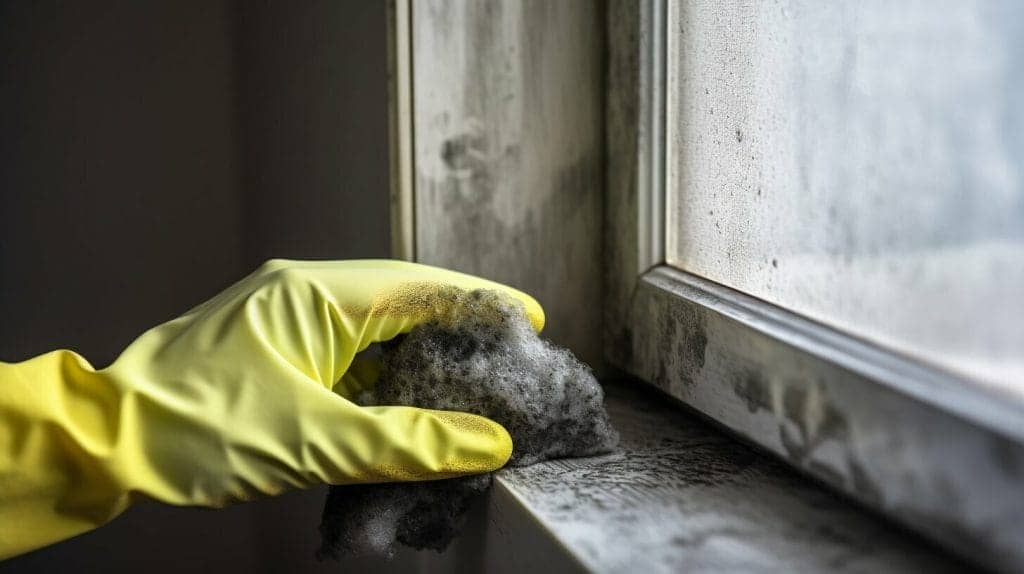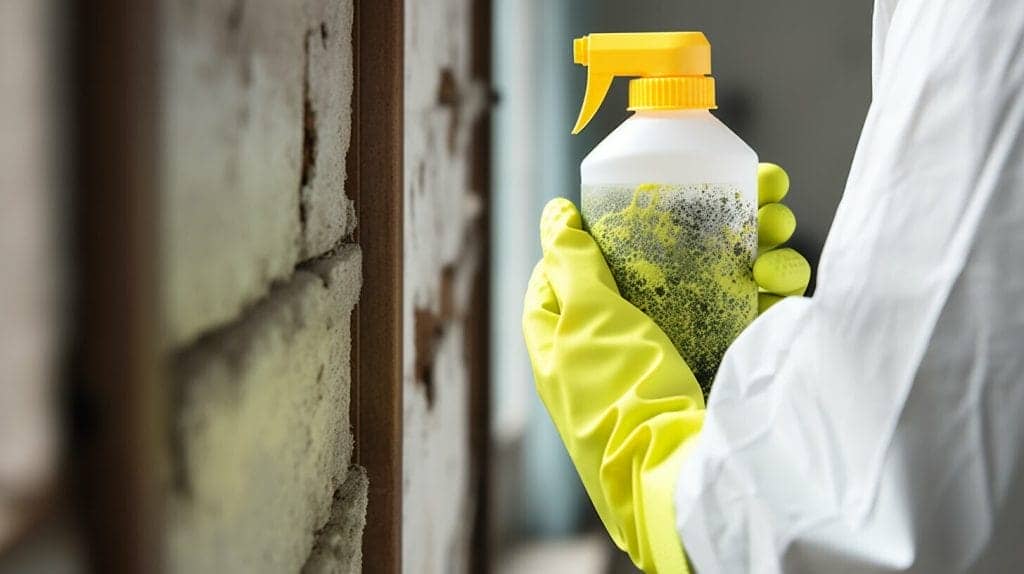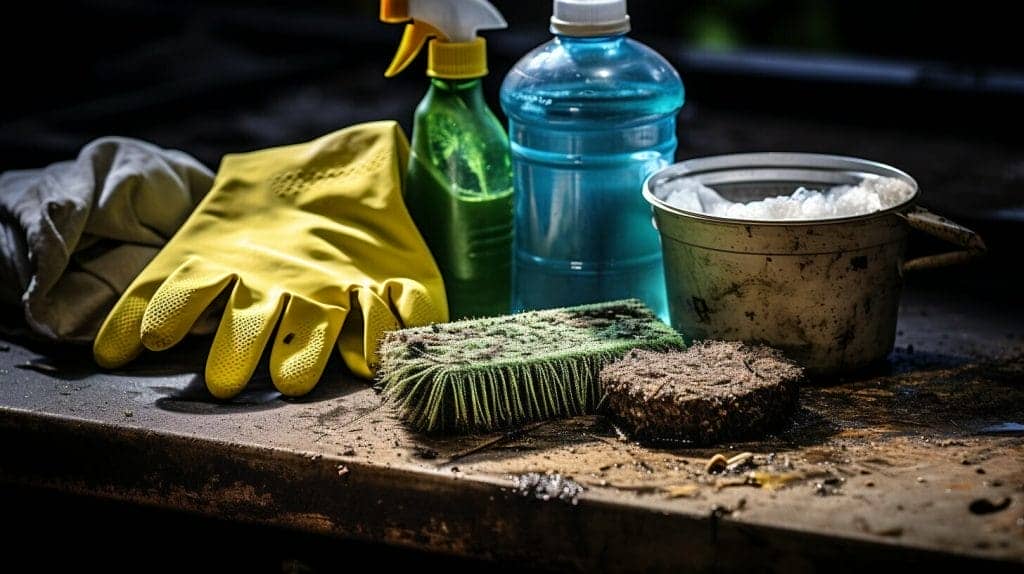Welcome to our comprehensive guide on how to remove mold from the brain. As we know, mold can have severe implications on our health, and it is essential to take care of our brain health, which is vital for our overall well-being. Mold-induced cognitive health issues can have significant consequences if not detected early and treated promptly. In this guide, we will provide valuable insights into the effects of mold exposure on the brain, ways to prevent it, and natural and medical treatments for brain mold removal.
Brain health is critical to our functioning and quality of life. As awareness for mold exposure increases, it is essential to understand its impact on the brain. The brain is susceptible to mold, which can cause cognitive health issues that can hinder our daily activities. Mold-induced cognitive health conditions can affect our memory, concentration, and overall brain function. In this guide, we will provide you with effective strategies and tips on how to remove mold from the brain to maintain its health and functionality.
Understanding Mold-Induced Cognitive Health
Exposure to mold can have severe effects on cognitive health, causing or exacerbating conditions such as depression, anxiety, memory loss, and attention deficit disorder. Mold spores produce mycotoxins which can be inhaled or ingested and penetrate the central nervous system leading to cognitive dysfunction.
Typical symptoms of mold-induced cognitive health issues include difficulty concentrating, brain fog, memory loss, and headaches. More severe symptoms may include tremors, seizures, and sudden changes in personality. If left untreated, mold-induced cognitive health issues could lead to long-lasting or permanent damage.
Brain Detoxification: Why It Matters
Brain detoxification is a crucial aspect of maintaining overall health and well-being. Our brains are exposed to numerous toxins and pollutants on a daily basis, which can have a significant impact on their function. These toxins can accumulate in the brain over time, leading to a range of health problems, including mold-induced cognitive health issues.
Fortunately, there are many methods and techniques available for detoxifying the brain, from natural remedies to medical treatments. Some of the key benefits of brain detoxification include:
| Benefits of Brain Detoxification |
|---|
| Improved cognitive function |
| Reduced risk of mold-induced cognitive health issues |
| Increased energy and mental clarity |
| Enhanced mood and emotional well-being |
There are several methods available for detoxifying the brain, including:
- Detox diets
- Herbal supplements
- Essential oils
- Meditation
- Exercise
Each of these methods works to remove toxins from the brain and improve its overall function. By incorporating brain detoxification methods into your daily routine, you can reduce your risk of mold-induced cognitive health issues, enhance your mental clarity, and enjoy a healthier, happier life.
Common Sources of Brain Mold Exposure
Mold growth is a common issue in a variety of different environments, including homes, workplaces, and other indoor spaces. Any space with high humidity, poor ventilation, and organic matter present can become a breeding ground for mold. When mold spores enter the air and are inhaled, they can enter the body and potentially cause health issues, including those affecting the brain. Here are some common sources of brain mold exposure:
| Source | Description |
|---|---|
| Water-damaged buildings | Buildings that have experienced water damage are at high risk for mold growth. Mold spores can easily spread through the air and contaminate the indoor environment. |
| Indoor plants | Plants that are overwatered or not well-maintained can harbor mold growth. Mold spores can easily spread from soil and plant surfaces into the air. |
| Carpeting | Carpeting can trap moisture and organic matter, making it an ideal environment for mold growth. Vacuuming and steam cleaning can help prevent mold growth. |
| Bathrooms | Bathrooms are typically high-humidity environments, making them a prime location for mold growth. Regular cleaning and ventilation can help prevent mold growth. |
| Kitchens | Kitchens are often damp environments due to cooking, washing dishes, and other activities. Regular cleaning and proper ventilation can help prevent mold growth. |
Preventing Mold in the Brain
Preventing mold growth in the brain is possible by taking care of the indoor environment and reducing exposure to mold. Here are some tips to prevent mold from entering the brain:
- Keep indoor humidity levels between 30-50% to discourage mold growth.
- Use air conditioning and proper ventilation to improve air circulation and reduce moisture.
- Regularly clean and maintain areas prone to moisture, such as bathrooms, kitchens, and other high-humidity environments.
- Fix any leaks or water damage immediately to prevent mold growth.
- Use dehumidifiers and air purifiers to improve indoor air quality and reduce mold spores present in the air.
Symptoms of Brain Mold Exposure
Mold exposure can cause a range of symptoms that affect the central nervous system, making it difficult to identify the root cause of the problem. Some of the most common symptoms of brain mold exposure are:
- Headaches
- Dizziness
- Fatigue
- Memory loss
- Difficulty concentrating
- Mood swings
- Anxiety
- Depression
It’s important to note that these symptoms can also be associated with other conditions, which is why seeking professional help is crucial in case of suspected mold-induced cognitive health problems.
How Does Mold Exposure Affect the Brain?
When mold spores are inhaled, they can spread throughout the body, including the brain. In the brain, mold can produce toxins called mycotoxins, which can damage brain cells and result in inflammation, oxidative stress, and compromised blood flow. Over time, this can lead to cognitive impairment, memory loss, and other neurological symptoms.
It’s important to address any suspected mold exposure in a timely and effective manner to prevent further damage to the brain and overall cognitive health.
The Role of Diet in Brain Health
The food we eat plays an essential role in our overall health and well-being, including brain health. To prevent mold-induced cognitive health issues, we need to be conscious of what we eat and what we avoid. Here are some brain health tips:
- Avoid processed foods, as they contain preservatives that can damage the brain.
- Include foods that are high in antioxidants like fruits and vegetables. These antioxidants help to protect the brain from damage caused by free radicals.
- Eat foods that are high in omega-3 fatty acids like salmon, chia seeds, and walnuts. These fatty acids are crucial to brain health and help to reduce inflammation.
- Consume foods that are rich in B vitamins like leafy greens, eggs, and whole grains. These vitamins help to boost brain function.
- Avoid foods that contain high levels of sugar, as they can lead to inflammation and neurodegenerative diseases.
By being mindful of what we eat and making healthy food choices, we can prevent the onset of mold-induced cognitive health issues and maintain optimal brain health.
The Risks of Self-Diagnosis
While it’s essential to be aware of the symptoms of mold-induced cognitive health issues, it’s crucial not to self-diagnose without expert medical help. Trying to navigate your way through the maze of possible diagnoses can sometimes do more harm than good. While on one side, you won’t receive timely and correct treatment, on the other, you will expose yourself to significant risks.
It’s easy to misinterpret your symptoms, and the internet often offers a plethora of unrelated information that can lead you down the wrong path. Some symptoms associated with mold-induced cognitive health issues may also be indicative of other serious medical conditions. Misdiagnosis can result in mistreatment, which can have severe consequences.
It’s prudent to seek medical help from a qualified healthcare professional if you experience any of the symptoms mentioned in Section 5. Your doctor will be able to diagnose the condition accurately and suggest the best course of treatment. They may even prescribe brain scans or other tests to help confirm the diagnosis.
Natural Remedies for Brain Mold
While medical treatments are available for removing mold from the brain, some people may prefer natural remedies and treatments. These remedies may help alleviate symptoms, boost brain health, and support the body’s natural detoxification process. Here are some natural remedies and treatments for removing mold from the brain:
- Essential Oils: Essential oils such as tea tree, lavender, and eucalyptus have antifungal and anti-inflammatory properties that may help reduce brain mold symptoms. Diffuse these oils or add them to a carrier oil and apply to the temples, neck, and soles of the feet.
- Vitamins and Supplements: Vitamins and supplements such as B-complex, vitamin C, magnesium, and probiotics may help support brain health and boost the immune system.
- Herbal Supplements: Herbal supplements such as garlic, oregano, and grapefruit seed extract have natural antifungal properties that may help reduce brain mold symptoms.
- Dietary Changes: Avoiding sugar, processed foods, and alcohol while increasing consumption of fresh fruits and vegetables, healthy fats, and clean proteins may help reduce inflammation and support brain health.
Consult with a healthcare provider before taking any new supplements or herbs, particularly if you have underlying health conditions or take prescription medications.
While natural remedies may be beneficial, they should not replace medical treatment if mold-induced cognitive health issues are present. Consult with a healthcare provider for a proper diagnosis and treatment plan.
Medical Treatments for Brain Mold
When it comes to removal of mold from the brain, medical treatment is an option. Note that treatment options depend on the severity of the situation and the patient’s needs. Here are some available medical treatments for brain mold removal:
| Treatment Type | Description |
|---|---|
| Anti-fungal drugs | Anti-fungal drugs such as Amphotericin B and Itraconazole are commonly used as medical therapies for removing mold from the brain. These drugs are often administered intravenously and can be effective in managing mold recovery. |
| Immunotherapy | Immunotherapy is also an option and involves administering allergy shots to the patient. This therapy works by gradually increasing the patient’s resistance to mold, thus strengthening their immune system to fight against mold exposure. |
| Cognitive rehabilitation | Cognitive rehabilitation is an effective medical treatment for mold-induced cognitive health issues. It involves a customized treatment plan that aims to improve the patient’s cognitive skills, such as memory and attention span, and thus, aid in recovery. |
What to Expect During Medical Treatment?
Patients undergoing medical treatment for removing mold from the brain may require hospitalization or frequent outpatient visits. They will receive medications, therapies, and cognitive-behavioral therapies as needed. Doctors will monitor their symptoms closely and administer treatment accordingly. Depending on the intensity of the exposure and the susceptibility of the patient, treatment may last for several weeks to months.
Preventing Mold from Entering the Brain
Mold exposure is a common issue that affects individuals of all ages and can have a detrimental impact on brain health. It is crucial to take necessary precautions to prevent mold from entering the brain. Here are some effective strategies that can help:
- Avoid damp or humid environments as mold grows and spreads quickly in such conditions.
- Fix leaks and water damage immediately to prevent mold growth.
- Upgrade ventilation systems to eliminate poor air quality and improve airflow.
- Use air filtration systems to remove airborne mold spores.
- Avoid using carpet in areas with high moisture such as basements and bathrooms.
- Keep indoor humidity levels low, ideally between 30-50% through regular use of dehumidifiers and air conditioning units.
- Regularly clean bathrooms, kitchens, and other areas with high moisture where mold can easily grow.
- Inspect your home regularly for any signs of mold growth and seek professional help immediately if you detect any.
By implementing these preventive measures, you can effectively reduce the risk of mold exposure and protect your brain health from potential damage.
Brain-Cleansing Techniques
Aside from brain exercise, there are various brain-cleansing techniques that help remove mold from the brain and improve its overall function.
Meditation
Meditation is a mindful practice that can help reduce stress and anxiety, which are known to exacerbate mold-induced cognitive health issues. In addition to its relaxation benefits, meditation has been shown to increase gray matter in the brain and improve cognitive function.
| Steps for Meditation |
|---|
| 1. Find a quiet and comfortable place where you can sit or lie down. |
| 2. Close your eyes and focus on your breath. |
| 3. Allow your mind to wander without judgment, then bring your attention back to your breath. |
| 4. Practice for at least 10 minutes each day. |
Exercise
Physical exercise is not only great for your body, but also for your brain. Regular exercise helps improve blood flow to the brain and promotes the growth of new brain cells. Exercise can also reduce inflammation, a common symptom of mold-induced cognitive health issues.
| Types of Exercise to Consider | Benefits |
|---|---|
| Aerobic exercise (e.g., brisk walking, jogging, swimming) | Increases oxygen flow to the brain, improves cardiovascular function, and promotes the growth of new brain cells. |
| Strength training | Builds muscle mass, increases bone density, and improves balance and coordination. |
| Yoga | Reduces stress, anxiety, and depression, and improves flexibility and balance. |
Brain Games
Brain games are a fun and effective way to keep your brain active and alert. They help improve cognitive function, memory, and attention to detail. Brain games can also improve hand-eye coordination and reduce stress.
- Word puzzles (e.g., crossword puzzles, word search puzzles)
- Number puzzles (e.g., Sudoku, Kakuro)
- Memory games (e.g., matching games, concentration games)
- Strategy games (e.g., chess, checkers)
Benefits of Brain Exercise
Incorporating regular brain exercise into your routine can have numerous benefits, especially for those dealing with mold-induced cognitive health issues. Here are some of the key benefits:
- Improves memory: Brain exercises like memorization and puzzles can help enhance memory function, making it easier to retain information and recall it when needed.
- Reduces stress: Engaging in brain exercises such as meditation and breathing exercises can help calm the mind and reduce stress levels.
- Boosts creativity: Brain exercises help improve cognitive function, which can lead to increased creativity and problem-solving skills.
- Enhances focus: Consistent brain exercise can improve focus and attention span, making it easier to concentrate on tasks and stay productive throughout the day.
Regularly incorporating brain exercise into your routine can be a great way to enhance brain health and combat mold-induced cognitive health issues.
The Power of Positive Thinking
In the battle against mold-induced cognitive health issues, maintaining a positive mindset can make a significant difference. Research shows that positive thinking can help reduce stress, anxiety, and depression – all of which can negatively impact brain function if left unchecked.
Here are some tips to cultivate a positive mindset:
- Practice gratitude: Cultivate an attitude of gratitude by focusing on the good things in your life.
- Surround yourself with positivity: Spend time with people who uplift you and engage in activities that make you happy.
- Focus on solutions: Instead of dwelling on problems, focus on finding solutions to overcome them.
- Challenge negative thoughts: Learn to recognize negative thought patterns and challenge them with positive affirmations.
- Practice self-care: Taking care of your physical and emotional needs can go a long way in promoting positivity and overall well-being.
By incorporating these tips into your daily routine, you can help maintain a positive mindset and improve your brain health.
Importance of Regular Check-ups
Regular check-ups are an essential part of maintaining good health, especially when it comes to mold-induced cognitive health issues. To avoid any potential harm to the brain, it is recommended that you get a thorough check-up every six months to a year, depending on your age and medical conditions.
During these check-ups, your physician will evaluate your cognitive function and provide you with a comprehensive diagnosis of your brain health. They may also recommend further tests to detect any signs of mold-induced cognitive health issues and offer medical treatment if necessary.
Regular check-ups can also help in the early detection and treatment of any underlying medical conditions that may lead to mold-induced cognitive health issues. By taking steps to address these issues early on, you can prevent further damage to the brain and maintain your cognitive health.
Brain Mold Removal FAQs
Here are some frequently asked questions about removing mold from the brain:
-
What methods are used to remove mold from the brain?
Medical treatments include anti-fungal drugs, immunotherapy, and cognitive rehabilitation. Natural remedies include essential oils, vitamins, and herbal supplements.
-
What are the symptoms of brain mold exposure?
Symptoms include fatigue, headaches, memory problems, confusion, and difficulty concentrating.
-
What are some ways to prevent mold from entering the brain?
Lifestyle changes such as proper hydration, maintaining a clean environment, and air filtration systems can help prevent mold from entering the brain.
-
Is brain mold exposure dangerous?
Mold exposure can cause serious damage to the central nervous system and cause cognitive health issues if left untreated.
-
Can brain cleansing techniques help remove mold from the brain?
Yes, brain-cleansing techniques like meditation, exercise, and brain games can help remove mold from the brain and improve its overall function.
Conclusion
Our brain health is vital to our overall well-being, and mold-induced cognitive health issues can have severe consequences if left untreated. By understanding the symptoms, sources, and prevention of brain mold exposure, we can take proactive steps to protect our brain health.
Take Action for Brain Health
Brain detoxification is crucial for maintaining optimal brain health, and there are various techniques and remedies available for removing mold from the brain. By adopting a healthy lifestyle, engaging in brain exercise and cleansing, and seeking regular check-ups with a physician, we can protect our brain health and avoid the risks of mold-induced cognitive health issues.
Stay Positive and Proactive
Having a positive mindset is essential in maintaining brain health and recovering from mold-induced cognitive health issues. We urge readers to stay informed, positive, and proactive in their approach to brain health and to seek professional help in case of any mold-induced cognitive health issues.
Remember, our brain is our most valuable asset, and we must protect it. By taking care of our brain health, we can lead a healthier, happier, and more fulfilling life.
Dr. Francisco Contreras, MD is a renowned integrative medical physician with over 20 years of dedicated experience in the field of integrative medicine. As the Medical Director of the Oasis of Hope Hospital in Tijuana, Mexico, he has pioneered innovative treatments and integrative approaches that have been recognized globally for the treatment of cancer, Lyme Disease, Mold Toxicity, and chronic disease using alternative treatment modalities. Dr. Contreras holds a medical degree from the Autonomous University of Mexico in Toluca, and speciality in surgical oncology from the University of Vienna in Austria.
Under his visionary leadership, the Oasis of Hope Hospital has emerged as a leading institution, renowned for its innovative treatments and patient-centric approach for treating cancer, Lyme Disease, Mold Toxicity, Long-Haul COVID, and chronic disease. The hospital, under Dr. Contreras's guidance, has successfully treated thousands of patients, many of whom traveled from different parts of the world, seeking the unique and compassionate care the institution offers.
Dr. Contreras has contributed to numerous research papers, articles, and medical journals, solidifying his expertise in the realm of integrative medicine. His commitment to patient care and evidence-based treatments has earned him a reputation for trustworthiness and excellence. Dr. Contreras is frequently invited to speak at international conferences and has been featured on CNN, WMAR2 News, KGUN9 News, Tyent USA, and various others for his groundbreaking work. His dedication to the medical community and his patients is unwavering, making him a leading authority in the field.
Contreras has authored and co-authored several books concerning integrative therapy, cancer, Lyme Disease and heart disease prevention and chronic illness, including "The Art Science of Undermining Cancer", "The Art & Science of Undermining Cancer: Strategies to Slow, Control, Reverse", "Look Younger, Live Longer: 10 Steps to Reverse Aging and Live a Vibrant Life", "The Coming Cancer Cure Your Guide to effective alternative, conventional and integrative therapies", "Hope Medicine & Healing", "Health in the 21st Century: Will Doctors Survive?", "Healthy Heart: An alternative guide to a healthy heart", “The Hope of Living Cancer Free”, “Hope Of Living Long And Well: 10 Steps to look younger, feel better, live longer” “Fighting Cancer 20 Different Ways”, "50 Critical Cancer Answers: Your Personal Battle Plan for Beating Cancer", "To Beat . . . Or Not to Beat?", and “Dismantling Cancer.”






















